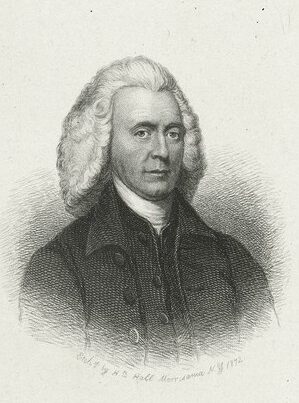From its port side northern Kentucky’s foremost tourist attraction looks exactly like a real vessel, a big one, with a ramp fitted along it to take on animals and supplies. From bow to stern it is 510 feet long, about as long as a modern missile frigate, and the designers have gone to great lengths to make the structure appear like a genuine seagoing craft. Visitors pass through a quarterdeck decorated with an emblem meant to represent the Tree of Life, and then into a dark, imposing cargo hold, stacked full of bamboo boxes, sacks of supplies, and row upon row of large clay jars. Life-sized dioramas illustrate and embellish the story: A family offers sacrifice prior to embarkation, one of the patriarch’s thickly-muscled sons sweats over a forge in a workshop, a naturalist’s study stands open for inspection, covered with scrolls, maps of the pre-Flood world, and sketches of exotic animals. There are staterooms, too, with little signs bearing biographies of the human race’s founding family. In the galley a young woman is frozen in time, preparing a meal from vegetables, fruits, and herbs, while the melodies of Middle Eastern wind-instruments wail out of hidden speakers.
The Ark Encounter is owned by Answers In Genesis (AIG), an organization which promotes a very particular reading of the Bible’s first book, a reading which among other things entails dinosaurs coexisting with men, skepticism regarding the theory of global warming, and a flood that covered the whole planet Earth. The aforementioned replica of Noah’s ark in Grant County is specifically devoted to this last proposition, and in one section of the tour the visitor is reminded of the mounting evidence that Mars was once entirely flooded. How ironic, proclaims the caption accompanying the images of Mars, that scientists accept a planet-wide Martian flood, but not the one related in Holy Scripture.
Elsewhere in the facility a biblical museum showcases centuries-old editions of said Scripture, and explains how the Bible has been translated into different languages and cultures. There is a movie theater where visitors watch a decidedly campy film about Noah’s troubles with his neighbors; there is a labyrinth of facades bearing a giant comic strip, wherein a fictional college student has a born-again experience following a devastating car wreck; to prove that a project like the ark would have been feasible in biblical times, one set of displays dwells at length upon ancient man’s technological and scientific accomplishments, from the Great Pyramid of Egypt to Erasthosthenes’ impressively precise calculation of the Earth’s circumference.
Other tourists draw the eye no less than do the exhibits. Some T-shirts bear slogans like Family –Faith – Friends – Flag – Firearms: Five Things You Don’t Mess With, while others announce the wearer’s affiliation with the Christian Motorcyclist Association or the Johnson City Free Will Baptist Church. The largest family in attendance is made up of about twenty African-Americans, and spans at least three generations. On the outside, underneath the ark’s bow, a guitar and bass duo performs gospel songs – “I’ll Fly Away,” “I Saw the Light,” and “Amazing Grace” – while a dozen or so Amish squint at the ark, evidently appraising the workmanship as they quietly exchange remarks in their native dialect. The visitors don’t seem to be sages, and are probably not saints, but then again they are not the people who have been terrorizing France, vandalizing monuments, or auctioning off the innards of unborn children, either.
How closely does AIG’s version of the story match the actual events upon which it is based? Who can say? What is indisputable is that even the unbeliever will admit (if he is honest) that the Bible is the foundation for so much of what is distinctive, interesting, and impressive about Western civilization and American history – especially Southern history.
Without knowing their Scripture, for instance, Kentuckians would surely have a hard time making heads or tails of Flood, the tantalizing unfinished work of internationally-celebrated Kentucky native Elizabeth Madox Roberts. In Roberts’ historical novel Old Testament themes are superimposed upon Louisville, which was engulfed by the Ohio River in January 1937. The young protagonist Joel Marsh seeks to rescue his sister and her children from the inundated metropolis, hoping thereby to find redemption for the sins he has committed against his late wife. In the strange new urban waterworld Marsh meets a harlot who urges him to forget his worries and revel with her, watches in a kind of trance as formations of police motorboats patrol the streets, and finally obtains a boat of his own to search the dark waters for his sister.
The foundation for Roberts’ dreamlike narrative is made clear, especially in one scene which presents Joel Marsh’s father Gabriel speculating darkly about the modern era, an age when men turn from God and against each other after having been enslaved to a new idol, oil. Afterward the family gathers to listen to Gabriel read:
His face was rough but it had been shaven the week before and on the morrow it would be shaven again, so that only a short stubble of bark beard grew over it. He brushed his hand upward over his face, as if no beard were there, and when he had settled the pages slowly, turning here and there, he found at last Exodus, and the twentieth chapter, fumbling now but minutely toward a word, toward the Word he meant to convey, and his rough forefinger settled at length and slowly to a point near the top of a page. His voice read, speaking slowly and impressively.
Later, in Louisville, the younger man Joel has a terrifying encounter with an oil slick that threatens to engulf his little boat in flames, like divine wrath, and the message of Gabriel’s Bible reading is thereby borne out: “I am Jehovah thy God, who brought thee out of the land of Egypt, out of the house of bondage. Thou shalt have no other gods before me.”
For the globalist elite, of course, idolatry is not merely a temptation, but a matter of principle. Shorn of elaborate rationalizations the liberal ethos is more or less summed up by the old adage “The grass is greener on the other side.” Hence I can’t help but wonder if it isn’t precisely because of its deep and undeniable connection to Kentucky’s culture and historic identity that journalists here in Kentucky have objected so stridently to the Ark Encounter. A relatively innocuous AIG real estate transaction is characterized as “a power move that could make Ark Encounter exempt from paying all taxes due to it being a religious organization.” The Ark could “cripple the [Grant County] school system,” we are warned. Still other liberal outlets have use the exhibit as an occasion to indulge in one of the liberal’s favorite pastimes, mocking Christianity.
Needless to say, were Grant County to ever become home to a museum celebrating the wisdom of some more fashionably-exotic work such as the Koran, say, or the Bhagavad-Gita, even the most absurd claims of the romanticized Other would be treated tolerantly by the leftist blogosphere. The tone would be at the very least respectful, and as likely as not downright sycophantic. Call it sycophancy or call it idolatry, the attitude of the Western elite is drawing down a deluge upon us and our children. We had all best learn what lessons we can from Noah – and Joel’s father – while there is still time.







